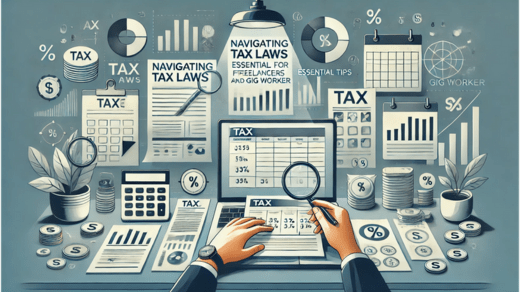In the ever-evolving landscape of freelancing and gig work, understanding tax laws is crucial for financial success and compliance. Unlike traditional employees, freelancers and gig workers face unique tax challenges that require careful navigation. Here are essential tips to help you manage your taxes effectively and stay on top of your financial responsibilities.
1. Understand Your Tax Obligations
As a freelancer or gig worker, you’re considered self-employed, which means you are responsible for paying both income tax and self-employment tax. Self-employment tax covers Social Security and Medicare contributions. This is different from traditional employment, where these taxes are automatically withheld from your paycheck.
Make sure to familiarize yourself with the tax rates and thresholds that apply to your income bracket. The IRS provides resources and tax tables to help you determine your tax liability.
2. Keep Detailed Records
Accurate record-keeping is vital for managing your taxes. Keep detailed records of all income and expenses related to your freelancing or gig work. This includes invoices, receipts, and bank statements. Organizing these records throughout the year can save you time and stress during tax season.
Consider using accounting software or apps designed for freelancers. These tools can help you track expenses, generate financial reports, and simplify the process of calculating your tax liability.
3. Separate Personal and Business Finances
To avoid confusion and streamline your financial management, maintain separate bank accounts and credit cards for your personal and business finances. This separation makes it easier to track business expenses and income, and it can also simplify tax reporting.
Having a dedicated business account ensures that you can accurately identify and deduct legitimate business expenses, which can reduce your taxable income.
4. Take Advantage of Deductions
Freelancers and gig workers can benefit from various tax deductions. Common deductions include:
- Home Office: If you use part of your home exclusively for work, you may be eligible to deduct home office expenses.
- Equipment and Supplies: Costs for computers, software, office supplies, and other business-related equipment can often be deducted.
- Mileage and Travel: If you use your vehicle for business purposes, you can deduct mileage or actual vehicle expenses. Additionally, travel expenses for business trips may also be deductible.
Be sure to keep detailed records and receipts for all deductions you claim. The IRS may require proof of these expenses if you are audited.
5. Pay Estimated Taxes
Unlike traditional employees who have taxes withheld from each paycheck, freelancers and gig workers must make estimated tax payments throughout the year. The IRS requires these quarterly payments to cover your income tax and self-employment tax obligations.
Use IRS Form 1040-ES to calculate and pay your estimated taxes. Failure to make these payments can result in penalties and interest, so it’s essential to stay on schedule.
6. Consider Hiring a Tax Professional
Navigating tax laws can be complex, especially for freelancers and gig workers with multiple income sources. If you’re unsure about your tax obligations or need help with tax planning, consider consulting a tax professional. A certified public accountant (CPA) or tax advisor with experience in freelance and gig work can provide valuable guidance and ensure you comply with all tax regulations.
7. Stay Informed About Tax Law Changes
Tax laws and regulations can change frequently. Stay informed about any updates that may affect your tax situation. The IRS website, professional tax associations, and financial news sources are excellent resources for the latest information on tax laws.
8. Plan for Retirement
As a freelancer or gig worker, you are responsible for your retirement planning. Contributing to a retirement account, such as a Solo 401(k) or a Simplified Employee Pension (SEP) IRA, can provide tax benefits and help you save for the future. Contributions to these accounts may be deductible, reducing your taxable income.
Conclusion
Navigating tax laws as a freelancer or gig worker requires careful attention and proactive management. By understanding your tax obligations, keeping detailed records, taking advantage of deductions, and making estimated tax payments, you can effectively manage your tax responsibilities. Consider seeking professional advice if needed and stay informed about tax law changes. With these tips, you’ll be better equipped to handle your taxes and focus on growing your freelance or gig business.

